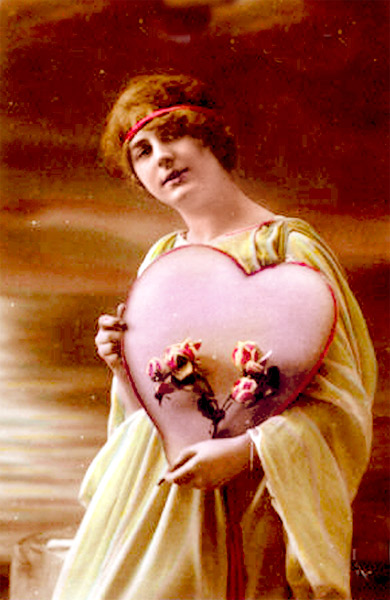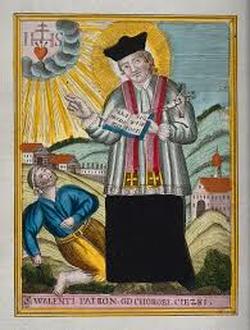
I have always considered it strange that Valentine’s day happens during Aquarius season. On the one publically sanctioned holy-day for love, why didn’t we choose a date when the sun is in Libra or Taurus, the two signs ruled by Venus? At least it would be warmer! Yet Valentine’s day is really more about romance--the idealized concept of love, the story of love, rather than Libra’s art or Taurus’ sensuality. Since it’s more about a universal idea than a personal one, it resonates surprisingly well with the humanitarian characteristics of Aquarians. Strangely enough, there are also Aquarian elements in the story of Valentinus of Rome, for whom the holiday is named.
Aquarians are often labeled as being “cool, aloof, detached,” yet Aquarians tend to be some of the most friendly, warm-hearted and romantic folks I know. Their reputation for aloofness comes from their natural observational qualities in which they are able to view the entire picture from an objective standpoint. Unlike their Leo opposites, they tend not to get dramatic, which can be misinterpreted as “lack of interest” (the cool reputation) but is much more often a result from seeing what’s collectively happening rather than being mired in the personal.
Aquarius is a fixed air sign, which means fixed ideals. Aquarians are the rebels, dreamers, reformers, humanitarians, the romantics. Fixed signs (those that fall in the middle portion of a season) have a quality of steadfastness, stability, and (at worse) rigidity to their element. How could one ever “fix” the air (keeping in mind the definition of fix that means to hold steadily, to set in place definitively)? Perhaps it is only through the individual breath that air can ever be held steadily, even if only for an instant, through song, through sighs, through the explosion of words. It is the cry of the infant, as well as the rebel, that says “I am here in this world.” Though individually experienced, breath implies presence, connection to a larger sphere, and even the humanitarian ideal that we all have a right to breathe free.
The collective air which we all breathe thus moves in through one’s own unique form, symbolized here by the Aquarius, in whom the personal becomes the universal very quickly again in the outbreath. Aquarians view the world with that particular spirit (or breath) towards making it better, in whatever way that means to the native. Therefore, love is never just love--it is beyond a concept, but always something bigger and fitting with a bigger picture. It is not love embodied or love performed, it is Love with a capital ‘L’ (perhaps ever seemingly out of reach).
Indeed, Aquarian natives generally have strong romantic sides and tend to idealize their mates. They can even become fixated, stuck on the pure vision of their beloved even when the said person falls short. Think knights and their pure chaste love of their ladies, poets spouting forth stanza after stanza for their muses, bards and their love songs. They are the ones who will make the dramatic gesture, the rebellious move; they are the Romeos who will go against their family, the Dantes going to hell and back for their Beatrices. Our culture is (over-)inundated with these visions of love, and though romantic love is so darn lovely and important, it ought to be balanced by the two other forms of love--platonic and fatuous--in order to make a balanced relationship. We often fall out of infatuation and are lost, which is when Robert Johnson says that we need a “stirring the oatmeal” kind of love, a love that is about two regular humans not two fantasy characters.
Aquarians are often labeled as being “cool, aloof, detached,” yet Aquarians tend to be some of the most friendly, warm-hearted and romantic folks I know. Their reputation for aloofness comes from their natural observational qualities in which they are able to view the entire picture from an objective standpoint. Unlike their Leo opposites, they tend not to get dramatic, which can be misinterpreted as “lack of interest” (the cool reputation) but is much more often a result from seeing what’s collectively happening rather than being mired in the personal.
Aquarius is a fixed air sign, which means fixed ideals. Aquarians are the rebels, dreamers, reformers, humanitarians, the romantics. Fixed signs (those that fall in the middle portion of a season) have a quality of steadfastness, stability, and (at worse) rigidity to their element. How could one ever “fix” the air (keeping in mind the definition of fix that means to hold steadily, to set in place definitively)? Perhaps it is only through the individual breath that air can ever be held steadily, even if only for an instant, through song, through sighs, through the explosion of words. It is the cry of the infant, as well as the rebel, that says “I am here in this world.” Though individually experienced, breath implies presence, connection to a larger sphere, and even the humanitarian ideal that we all have a right to breathe free.
The collective air which we all breathe thus moves in through one’s own unique form, symbolized here by the Aquarius, in whom the personal becomes the universal very quickly again in the outbreath. Aquarians view the world with that particular spirit (or breath) towards making it better, in whatever way that means to the native. Therefore, love is never just love--it is beyond a concept, but always something bigger and fitting with a bigger picture. It is not love embodied or love performed, it is Love with a capital ‘L’ (perhaps ever seemingly out of reach).
Indeed, Aquarian natives generally have strong romantic sides and tend to idealize their mates. They can even become fixated, stuck on the pure vision of their beloved even when the said person falls short. Think knights and their pure chaste love of their ladies, poets spouting forth stanza after stanza for their muses, bards and their love songs. They are the ones who will make the dramatic gesture, the rebellious move; they are the Romeos who will go against their family, the Dantes going to hell and back for their Beatrices. Our culture is (over-)inundated with these visions of love, and though romantic love is so darn lovely and important, it ought to be balanced by the two other forms of love--platonic and fatuous--in order to make a balanced relationship. We often fall out of infatuation and are lost, which is when Robert Johnson says that we need a “stirring the oatmeal” kind of love, a love that is about two regular humans not two fantasy characters.

Though there were various early Christian martyrs named Valentinus, most of our current February 14th traditions follow Saint Valentine of Rome. Legends speak of Valentine as ministering to Christians, converting Romans to Christianity, and performing marriage rites for soldiers--all of which was forbidden under the Roman Empire and thus the grounds for his eventual execution. But before he died, he healed his jailer's daughter of blindness and supposedly sent her the first ever “Valentine’s day card” (at that point just a note signed “your Valentine”). According to legend, he paper hearts that characterize Valentine's day come from parchment hearts that he would give to those in his ministry to remind them of of God’s love. The love in this story isn't sensual love; it's not about chemistry, physical affection, or even partnership or relationship. It's "pure" love, "chaste" love, poetic love, inspired love--romantic love.
This is what fascinates me about this account: it is still not so much about personal love as it is about the ideal of love--God’s love, even. And yet, the love was very real to Valentine, his personal passion. Valentine was no Casanova, but he was a rebel, an idealist, a reformer. Like the chivalrous knights that would follow in years to come, he would die for his noble romantic cause. Sound familiar? Though his birthday is unknown, he could very well be an Aquarius.
Speaking of Romans, the word romance comes from 1300 meaning “a story written about a hero or knight,” which can be traced through French back to romanice scribere, Latin, meaning “to write in in the Roman style.” Romance implies story, specifically tracing back to the early transcribed narrative of chivalrous knights and heroes. Specifically, a fixed story--affixed to the page by writing, affixed by time. (And here I must add the side note that Aquarians are often victims of their own fixed stories!) Yet the root of story is breath moving into form, into ideas, before the written page even existed. The root of story is the hero, the rebel, the one who dares to love despite all odds. Sin bravely! Valentine’s day is too often dichotomized into “have loves” and “have nots”--we all have a fire to steal from the Gods as Prometheus did. What makes your own inner bard sing, your own inner rebel act out, your own inner knight set forth? What are your own heart images to send into the world?
This is what fascinates me about this account: it is still not so much about personal love as it is about the ideal of love--God’s love, even. And yet, the love was very real to Valentine, his personal passion. Valentine was no Casanova, but he was a rebel, an idealist, a reformer. Like the chivalrous knights that would follow in years to come, he would die for his noble romantic cause. Sound familiar? Though his birthday is unknown, he could very well be an Aquarius.
Speaking of Romans, the word romance comes from 1300 meaning “a story written about a hero or knight,” which can be traced through French back to romanice scribere, Latin, meaning “to write in in the Roman style.” Romance implies story, specifically tracing back to the early transcribed narrative of chivalrous knights and heroes. Specifically, a fixed story--affixed to the page by writing, affixed by time. (And here I must add the side note that Aquarians are often victims of their own fixed stories!) Yet the root of story is breath moving into form, into ideas, before the written page even existed. The root of story is the hero, the rebel, the one who dares to love despite all odds. Sin bravely! Valentine’s day is too often dichotomized into “have loves” and “have nots”--we all have a fire to steal from the Gods as Prometheus did. What makes your own inner bard sing, your own inner rebel act out, your own inner knight set forth? What are your own heart images to send into the world?

 RSS Feed
RSS Feed
